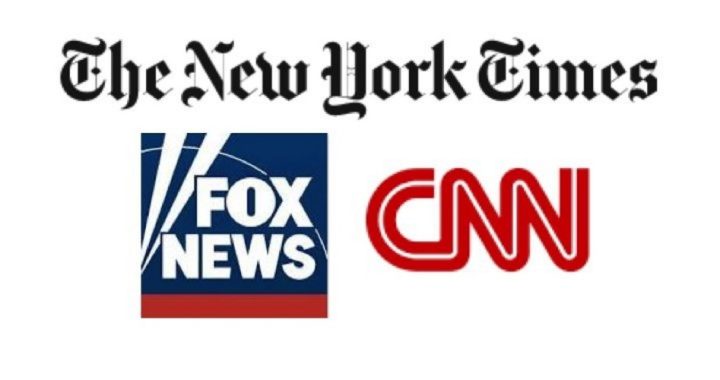
Perhaps it’s evidence of how liberals project their own behaviors onto others when leveling accusations. Or maybe it’s just nonsense. What’s for sure is that hard left-wing New York Times and CNN, along with more moderate Fox News, are being sued for it: racial discrimination.
CNN has raised the most hackles of the three, with up to 175 present and former employees interested in joining a class-action racial-discrimination suit against the network. The Times case was filed last year on behalf of two black female employees by New York attorney Douglas Wigdor. Wigdor, apparently a very busy man, is also representing a total of 13 employees in two separate lawsuits against Fox.
The Times suit alleges that CEO Mark Thompson created an office culture of “deplorable discrimination” based on race, sex, and age. The plaintiffs claim the paper favors young, white, single staffers over older black and female employees.
As the Guardian reported last year, “‘Unbeknownst to the world at large, not only does the Times have an ideal customer (young, white, wealthy), but also an ideal staffer (young, white, unencumbered with a family) to draw that purported ideal customer,’ the lawsuit, which the women’s lawyer said could be extended to up to 50 similar alleged victims, states. ‘In furtherance of these discriminatory goals, the Times has created a workplace rife with disparities.’”
As for the lawsuit against CNN, it alleges that “the company’s Atlanta headquarters is rife with racism,” the New York Post informs.
The paper continues, “Minority employees had to endure bigoted remarks such as ‘It’s hard to manage black people’ and ‘Who would be worth more: black slaves from times past, or new slaves?’” according to two ex-workers.
The first Fox lawsuit is a “class-action complaint by 11 employees who accuse the network of ‘abhorrent, intolerable, unlawful and hostile racial discrimination.’ … The second was brought by black ex-payroll employees Tichaona Brown and Tabrese Wright. They say their boss, who eventually was fired, trafficked in ugly stereotypes, including implying that black men were ‘women beaters,’” the Post also tells us.
It certainly wouldn’t be surprising if the leftist Times and CNN were preaching but not practicing, a common “progressive” phenomenon illustrated well in “Don’t listen to the liberals — Right-wingers really are nicer people, latest research shows.” Nor would it be a shock to learn the plaintiffs are paranoid, are opportunists, and/or are seeking revenge. Yet our response should regardless be the same.
Who cares?
This isn’t to say ugly discrimination isn’t just that or that it may not warrant remedial scorn and ostracism, only that we’ve forgotten a simple principle that, if adhered to, would eliminate all these expensive lawsuits: freedom of association.
It’s not hard to argue for and is as American as apple pie. Consider: We would agree that you can include in, or exclude from, your home whomever you wish for any reason you please, whether it because he’s male, black, white, thin, boring, a coffee drinker, or simply because you don’t like his face.
Why should you lose that right merely because you decide to erect a retail façade and sell food, cakes, flowers, or photographic or wedding-planning services?
It’s still your property, paid for with your own money and created by the sweat of your own brow. To say that, somehow, you lose your rights because you want to use it to engage in commerce is tyrannical and a sort of economic blackmail: “If you want to earn a living, you have to accept rules based on Big Brother’s ideology.”
There is no sound moral argument against this, only a shallow legal one: Some judges decades ago rationalized that businesses are “public accommodations.” Of course, this doesn’t bring us all the way to Marxism’s abolition of private property, but it does blur the distinction between the public and private.
It’s a slippery slope, too. With freedom of association held in contempt today, we’ve not only seen American businesses forced to accommodate Islamic norms, but Christian businessmen persecuted — and sometimes put out of business — for refusing to service events (faux marriages) they find morally objectionable.
Moreover, through all the regulation, lawsuits, government fines, and billions poured into lawyers’ coffers, a simple question is seldom asked: Is all this tyrannical government intrusion worth it just to stop one percent of the population from engaging in unjust commercial-arena discrimination?
In reality, such private-sector trespasses are what private-sector remedies (e.g., market and social pressure) are for. An example is baseball, whose 1940s racial integration occurred completely absent government coercion.
Complicating this matter is that racial, ethnic, and sexual discrimination is sometimes justifiable. As I wrote in 2015:
How is the government qualified to determine what constitutes unjust discrimination? One may say that the racial variety is an open-and-shut case, but is this really true? Consider that a German or West Indian restaurant might wish to hire, respectively, only white or only black waitstaff for the purposes of authenticity. Some might object, saying that the establishment should retain the first qualified person who comes along. But what constitutes qualifications?
I know of a female gynecologist who will only hire a woman assistant because she assumes this will make her exclusively female patients more comfortable. It’s also conceivable that daycare centers might prefer hiring women. And the top 10 female fashion models earned 10 times as much in 2013 as did their male counterparts. Unjust? The ignoring of qualifications?
Maybe not. A model’s qualifications involve far more than the ability to parade up and down a runway. The job actually involves attracting and pleasing a market. This is why being attractive, and not ugly, is a qualification. And given that women models obviously have a more lucrative market, it’s why “being female” is integral to maximizing modeling success. Likewise, if male staff members make customers less likely to frequent a gynecological office or daycare center, are they as “qualified” for that role as female staff?
Now, what of having waitstaff of the “wrong race” in a restaurant? If the reduction in authenticity diminishes business, isn’t being of the relevant race integral to the job qualifications?
And, of course, such judgments are often tolerated, as no one takes up the cudgels for men who might apply for jobs in daycare centers or gynecological offices. It’s only politically incorrect racial and sex discrimination that gets attention.
I don’t know if the Times’ alleged hiring standard (“young, white, unencumbered with a family”) has any basis in market realities. The paper would be better served if it just started reporting the truth. But this brings up another point: If it’s illegal to discriminate based on age and race, why is it legal (federally and in half the states) to discriminate based on marital status?
Because the government hasn’t ended “discrimination,” an impossible task since it simply means choosing one or some from among many (also known as “hiring”). It has merely decided what type of discrimination will be allowed, as it creates “protected classes” and, by extension, essentially “unprotected classes.”
In other words, it discriminates among types of discrimination.
The only good news in this story is that, after years of playing the race card and promoting political correctness, the New York Times and CNN are being hoisted on their own petards. What goes around comes around — and sometimes that’s a beautiful thing.



